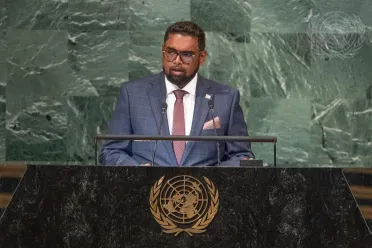Statement
Statement summary
MOHAMED IRFAAN ALI, President of Guyana, noting the unequal distribution of COVID-19 vaccines and widening inequalities between the rich and poor as a result, stressed that there must be an immediate re-examination of the financing gap and the debt portfolio of developing countries to open fiscal space and create an opportunity for recovery and attaining the Sustainable Development Goals. The World Food Programme (WFP) and Food and Agriculture Organization of the United Nations (FAO) warned that acute food insecurity would worsen in 20 hunger hotspots in June to September 2022, he said, detailing related issues such as surging food prices, supply chain constraints, hike in energy costs and the war in Ukraine. Noting dire projections on production and food import costs, he said the reversal of export bans on rice and wheat and freeing up of grains could help that situation. He urged world leaders to “find the balance now” and to work collectively to prevent the widening of inequalities and social and economic havoc.
According to the World Bank and Global Trade Alert, between January — June 2022, 135 policy measures were announced or implemented that affected trade in food and fertilizer, he said. During the same period 34 nations imposed restrictive export measures on food and fertilizers. He asked whether globalization is only applicable under normal conditions, or opportunistic in its application such that when a crisis arises “we lock ourselves in and forget about multilateralism and globalization”. The evidence is glaring, he said, pointing to the COVID-19 vaccination and access to food and fertilizer. He welcomed FAO’s Global Food Import Financing Facility, which seeks to respond to the prevailing soaring food import costs and addressing the needs of the most exposed. However, there is need to revise the eligibility criteria to accommodate countries beyond the categories of low-income and lower-middle-income groups, he said, pointing out that that narrow grouping heightens the chance that many at-risk, economically vulnerable countries, such as the Caribbean with large food and food import needs, will be excluded.
Turning to the climate crisis, he said the costs of adaptation are most likely to be higher than the predicted range of $140–300 billion annually by 2030 and $280–500 billion annually by 2050 for developing nations, citing the Adaptation Gap Report 2021: The Gathering Storm. He underscored that: “The paltry $100 billion pledge and the failure to meet it must be viewed in the context of the likely costs of climate action for mitigation, adaptation and addressing loss and damage. It is not enough.” The adoption of broad rules on carbon markets in Glasgow has the potential to unlock critical resources for forest-rich countries, he said, noting that forested countries, like his own, can potentially earn billions of dollars accessible through the voluntary carbon markets. However, the current approximate price is $10 per ton on the voluntary market, while according to an IMF report, the price should be closer to $70 per ton. In that regard, the twenty-seventh Conference of Parties to the United Nations Framework Convention on Climate Change (COP27) must make progress in refining the rules for the implementation of Article 6 of the Paris Agreement and make decisions that would increase the price of carbon traded in voluntary carbon markets.
Turning to the energy crisis, he said that according to the International Energy Agency, global electricity demand grew by 6 per cent in 2021 and is projected to grow by 2.4 per cent in 2022, of which only 50 per cent is expected to be met from renewables. As such, the other 50 per cent would have to be met from non-renewable energy sources. “In this energy transition, fossil fuel remains necessary,” he said, pointing out that “new entrants” like his country must be part of this balanced approach. Even as a new entrant, Guyana proposed the removal of subsidies from fossil fuel production and advocated the need for a strong global carbon price. However, new entrants should not be punished by removing access to financing and increasing costs of financing, he said, noting that that would protect an existing monopoly, drive up the costs of investments and deliver a higher priced product.
To reduce the country’s food import bill and increase food security, his Government is cultivating and investing in new technology and smart agriculture. It aims to position the country as a leading food producer in the Caribbean community, providing incentives, capital, land and opportunities for youth and women to participate in the agriculture transformation. To that end, it has earmarked 35 per cent of all new agrobusiness to be led by women and have increased youth participation in agriculture with the use of technology by more than 40 per cent. Turning to climate change and biodiversity loss, he said his country’s forests — the size of the United Kingdom — store 19.5 gigatons of carbon with a deforestation rate of less than 0.05 per cent. It intends to continue the sustainable management of its forests as a key national and global good. Having already achieved net-zero status, it is working steadfastly in its transition from a 2020 status of 95 per cent dependence on heavy fuel oil and diesel to an energy mix which includes hydropower, solar, wind and natural gas. From that, more than 500 megawatts of new generating capacity will come on stream; of which 87 per cent of this generated energy will be from clean and renewable sources.
Full statement
Read the full statement, in PDF format.
Photo

Previous sessions
Access the statements from previous sessions.
